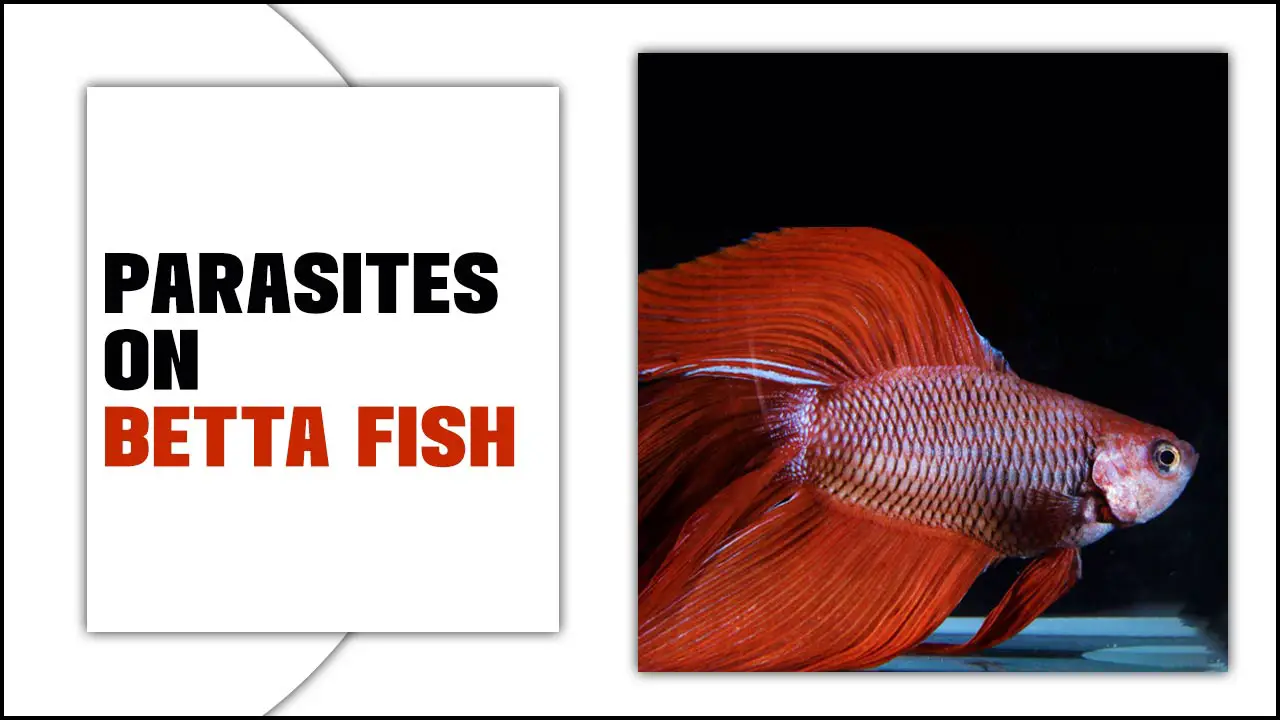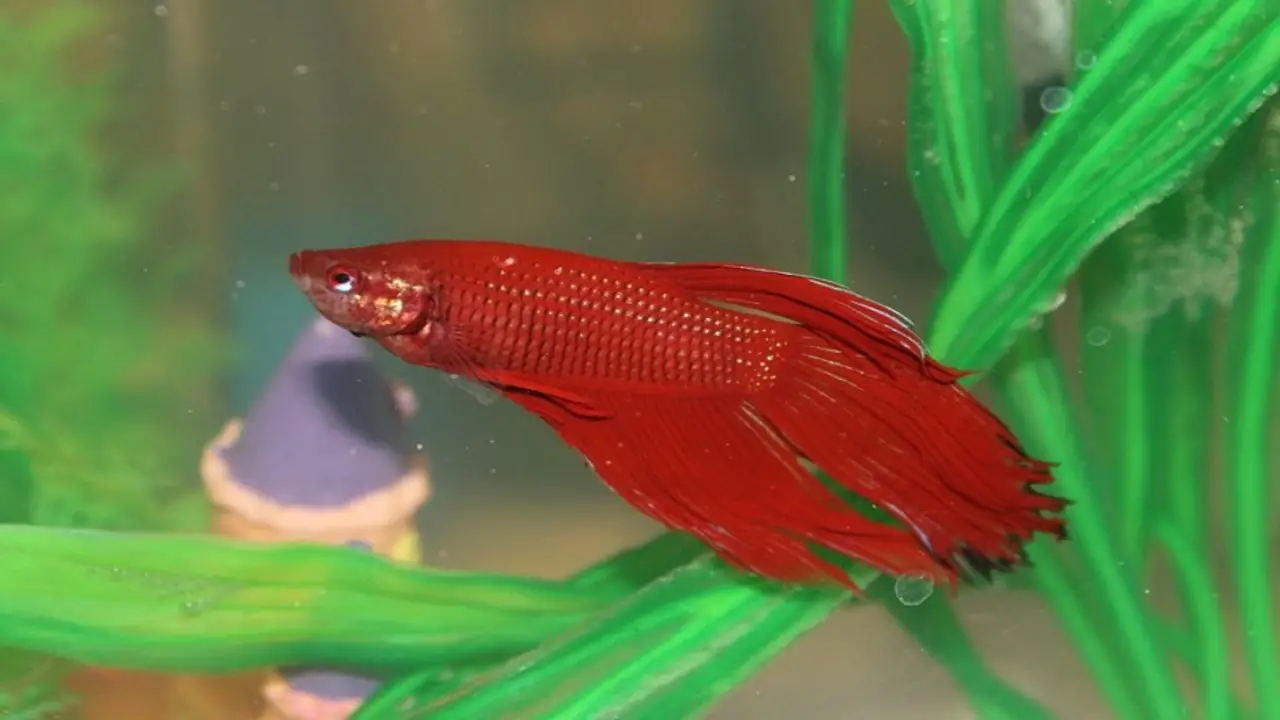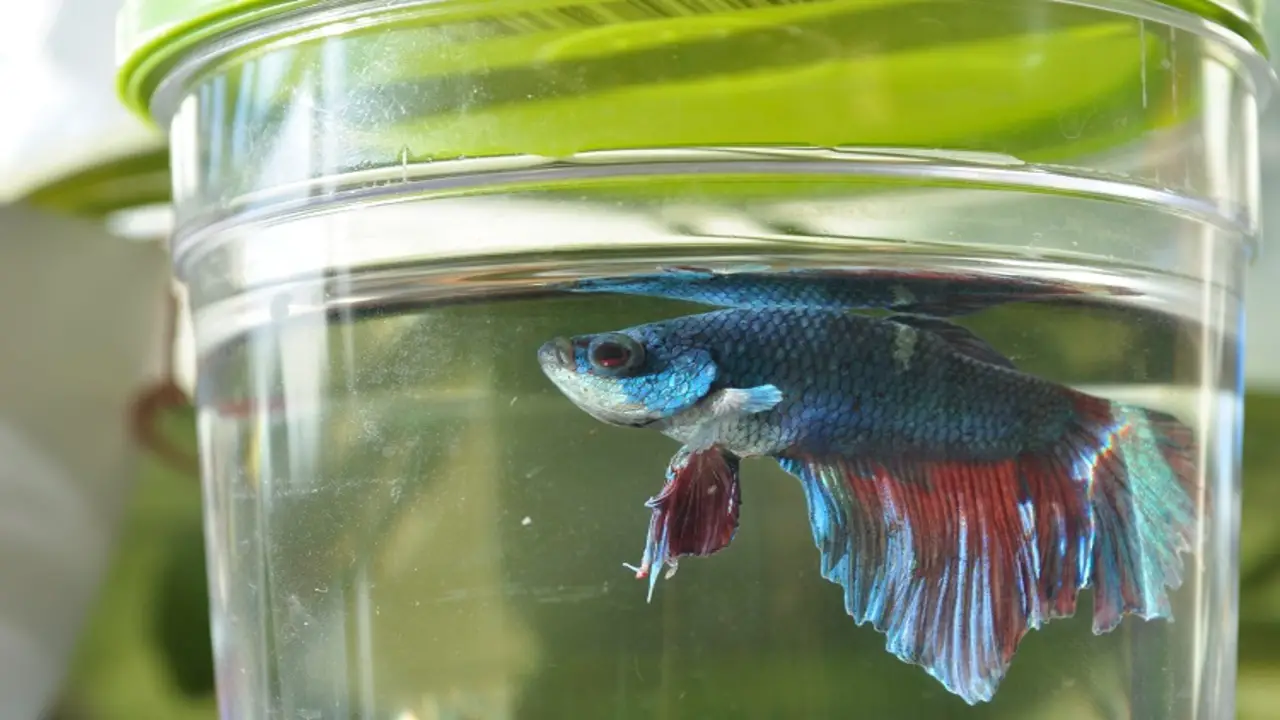Betta fish are a sought-after species for many aquarium enthusiasts due to their vibrant colors and unique personalities. However, these beautiful creatures are not immune to the presence of parasites.
Parasites on Betta fish can cause a range of health problems, including lethargy, loss of appetite, and in severe cases, death. It is important for Betta fish owners to understand the causes and treatment options for these parasites to ensure the long-term health of their beloved fish.
Several parasites, including protozoan parasites, can infect Betta fish and external and internal parasites. Protozoan parasites are single-celled organisms that can cause diseases such as velvet or ich, while external parasites like anchor worms and fish lice attach themselves to the fish’s skin. On the other hand, internal parasites live inside the fish’s body and can cause severe damage to the fish’s organs.

How To Identify And Treat Parasites On Betta Fish

Parasites can be a common issue in betta fish, and it is important to identify and treat them promptly. There are several signs that your betta fish may have parasites, including a loss of appetite, lethargy, white spots or patches on the body, and changes in behaviour.
If you notice any of these symptoms, it is important to take action quickly. One way to treat parasites on betta fish is by using medication specifically designed for this purpose. These medications can help eliminate the parasites and restore your betta fish’s health. Maintaining clean water conditions and providing a balanced diet to support your betta fish’s immune system is also essential. Regular observation and proper care can go a long way in preventing and treating parasites in betta fish.
Common Parasites That Affect Betta Fish
Betta fish are vulnerable to a variety of parasites that can cause harm to their health. If you suspect your betta fish has parasites, it is important to take immediate action to treat them. Consult a veterinarian or a knowledgeable pet store employee to determine the best treatment for your situation. Parasitic infections early. Several common parasites can affect betta fish. These include:
- Ich (Ichthyophthirius multifiliis): This parasite causes small white spots on the fish’s body and fins.
- Velvet (Oodinium): Velvet appears as a fine, gold, or rust-colored dust on the fish’s body and fins.
- Flukes (Monogenea): Flatworms attach themselves to the fish’s skin and gills, causing irritation and damage.
- Anchor worms (Lernaea): Anchor worms are visible parasites that look like tiny threads sticking out of the fish’s body.
- Gill mites: Gill mites live in the fish’s gills and can cause respiratory problems.
Signs And Symptoms Of Parasite Infestation In Betta Fish

Lethargy, loss of appetite, and abnormal swimming behaviour are common signs of parasite infestation in betta fish. Physical symptoms may include white spots, red or swollen gills, and discoloured or cloudy eyes. Regularly observing and monitoring your betta fish’s behaviour and appearance are crucial to identifying early infestation signs.
Treatment options for parasite infestations in betta fish include medication, water changes, and improving the overall cleanliness and quality of the fish’s environment. In severe cases or with unfamiliar parasites, consultation with a veterinarian or experienced aquarium specialist may be necessary.
How To Properly Diagnose Parasites In Betta Fish
Correctly diagnosing parasites in betta fish is crucial for their health and well-being. Identifying parasites on betta-fish can be challenging, as they are often tiny and difficult to see with the naked eye. However, some signs may indicate the presence of parasites, such as visible spots or discolouration on the fish’s body, abnormal behaviour or swimming patterns, and changes in appetite.
If you suspect that your betta fish has parasites, it is important to consult with a veterinarian who specializes in fish health. They can perform a thorough examination and conduct tests to determine the type of parasite present and recommend appropriate treatment options. The sooner parasites are diagnosed and treated, the better your betta fish’s chance for a full recovery.
Treatment Options For Betta Fish Parasites
To treat parasites on betta-fish, various options are available. Salt baths can be effective for certain types of parasites. Medications like praziquantel and metronidazole are commonly used to treat a range of parasites. Maintaining clean water and a balanced diet can also help prevent parasite infestations.
Using quarantine tanks to isolate infected fish can prevent the spread of parasites to other tank mates. It is recommended to consult with a veterinarian or experienced fish keeper for additional treatment options. By implementing these treatment strategies, betta fish owners can effectively combat parasite infections and ensure the health of their aquatic companions.
Medications And Remedies For Treating Betta Fish Parasites

Various medications and remedies are available to treat parasites on-betta fish effectively. Commonly used medications include praziquantel and metronidazole, which can be properly dosed based on the betta fish tank size. Natural remedies such as garlic and salt baths can also be helpful in treating parasites.
However, prevention is key to avoiding parasitic infections. This can be achieved by maintaining good water quality, avoiding overcrowding, and practising quarantine procedures for new fish. It is always advisable to consult a veterinarian or experienced fish keeper for the best treatment options.
Prevention Measures To Avoid Parasite Infestation In Betta Fish
Maintaining good water quality is crucial in preventing parasite infestation in betta fish. Avoid overfeeding your betta, as it can lead to poor water quality due to excess waste. When introducing new fish to your aquarium, quarantine them for at least two weeks to ensure they are parasite-free.
Use a water conditioner to remove harmful chemicals and maintain a healthy tank environment. Regularly check your betta for signs of illness or parasites, such as lethargy or abnormal behaviour. Following these preventive measures can reduce the risk of parasite infestation in your betta fish.
Proper Aquarium Maintenance To Prevent Parasite Outbreaks
Proper aquarium maintenance is crucial in preventing parasite outbreaks in Betta fish. Regular water changes and tank cleaning help maintain good water quality, reducing the risk of parasites. Overfeeding and poor water quality can increase the chances of parasites in the tank, so feeding your Betta fish appropriately and monitoring water parameters is essential.
Quarantining new fish before introducing them to the main tank prevents the introduction of parasites. Proper filtration and temperature control also create an environment less favourable for parasites. Treatment options for parasites in Betta fish include medication, salt baths, and herbal remedies.
Quarantine Procedures For New Betta Fish To Prevent Parasite Transmission

Quarantining new betta fish before introducing them to a community tank can help reduce the risk of parasite transmission. During the quarantine period, setting up a separate tank with clean water and equipment is essential. Keep a close eye on the fish for any signs of illness, such as lethargy or loss of appetite. If necessary, administer parasite treatments like medication or salt baths.
Following proper quarantine procedures is essential to prevent the spread of parasites to other fish in the tank. Regular water changes and tank maintenance also contribute to a healthier environment for your betta fish.
Tips For Maintaining A Healthy Environment For Your Betta Fish
Regular water changes are crucial to ensure a healthy environment for your betta fish. This helps maintain good water quality, preventing fish waste buildup, which can attract parasites and harmful bacteria. Parasites can be a common issue for betta fish, but there are steps you can take to maintain a healthy environment and prevent infestations. Here are some tips to keep your betta fish parasite-free:
- Regularly clean the tank: Maintaining a clean and well-maintained tank prevents parasites. Clean the tank regularly by removing uneaten food, debris, and waste.
- Quarantine new fish: Before introducing any new fish to your betta’s tank, it is essential to quarantine them first. This will help prevent the transfer of parasites or diseases from the new fish to your betta.
- Monitor water quality: Poor water quality can weaken your betta’s immune system, making them more susceptible to parasites. Regularly test the water parameters such as ammonia, nitrite, and nitrate levels and ensure they are within appropriate ranges.
- Avoid overfeeding: Overfeeding can lead to excess waste in the tank, creating an ideal breeding ground for parasites. Feed your betta small amounts of food 2-3 times daily and remove any uneaten food after a few minutes.
- Provide proper nutrition: A well-balanced diet is crucial for maintaining your betta’s overall health and immune system. Feed them high-quality pellets or flakes specifically formulated for bettas.
- Avoid introducing live food without proper quarantine: Live foods such as brine shrimp or bloodworms can carry parasites. If you feed live foods, ensure they have been properly quarantined or purchased from a reputable source.
Following these tips can create a healthy and parasite-free environment for your beloved betta fish.
Conclusion
It is crucial to be vigilant about the health of your betta fish and take immediate action if you suspect any parasite infestation. You can quickly diagnose and treat the issue by being aware of the common parasites that affect betta fish and understanding the signs and symptoms of infestation.
Utilizing proper medications and remedies, along with implementing prevention measures and maintaining a healthy aquarium environment, will help ensure the well-being of your beloved betta fish. Remember to regularly perform quarantine procedures for new fish to prevent parasite transmission and provide your betta fish with the care they deserve. We have provided bulk information for parasites on betta fish and hope our information was helpful from your perspective.
Frequently Asked Questions
How Do I Know If My Betta Fish Has Parasites?
Symptoms of parasitic infections in betta fish include loss of appetite, lethargy, and changes in faeces consistency. Physical signs may include discolouration or fin damage. It’s essential to consult a veterinarian or experienced aquarist for diagnosis and treatment. Regular water changes and proper aquarium maintenance are crucial for preventing parasitic infections.
What Does A Betta Fish Parasite Look Like?
Betta fish parasites can vary in appearance and may not be visible to the naked eye. Common parasites include anchor worms, gill flukes, and fish lice. Infestation signs include lethargy, loss of appetite, and white spots or lesions. Consult a professional for proper identification and treatment.
Are Anchor Worms Fatal To Betta Fish?
Anchor worms can be deadly for betta fish if not treated promptly. These external parasites burrow into the fish’s skin, causing damage. Look out for symptoms like red sores, inflammation, and lethargy. Treat anchor worms with medication baths or manually remove them with tweezers.
How To Prevent Diseases In Betta Fish?
To prevent diseases in Betta fish, keeping their tank clean and maintaining good water quality is essential. Avoid overfeeding and provide a varied diet for your Betta fish. Quarantine new fish before introducing them to the tank and regularly check for signs of illness or parasites.
How Long Do Betta Fish Live?
On average, betta fish have a lifespan of 2-4 years in captivity. However, with proper care, a healthy diet, and optimal living conditions, they can live up to 5 or more years. Water quality, tank size, and stress levels also affect their longevity.

Aquarium passion is all about connecting with the aquatic life and providing education to the public on the importance of these creatures. We showcase a wide variety of marine life through our exhibits as well as working with schools to provide unique learning opportunities for students of all ages.








